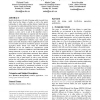163 search results - page 23 / 33 » Representing Aggregators in Relational Probabilistic Models |
SIGIR
2006
ACM
14 years 1 months ago
2006
ACM
Pseudo-relevance feedback has proven to be an effective strategy for improving retrieval accuracy in all retrieval models. However the performance of existing pseudo feedback meth...
COLING
2002
13 years 7 months ago
2002
We present a comparative evaluation of two data-driven models used in translation selection of English-Korean machine translation. Latent semantic analysis(LSA) and probabilistic ...
EDBT
2009
ACM
14 years 2 months ago
2009
ACM
This paper introduces the problem of modeling urban transportation systems in a database where certain aspects of the data are probabilistic in nature. The transportation network ...
ROBOCOMM
2007
IEEE
14 years 1 months ago
2007
IEEE
Abstract—Robust, dependable and concise coordination between members of a robot team is a critical ingredient of any such collective activity. Depending on the availability and t...
KDD
2009
ACM
14 years 8 months ago
2009
ACM
Spatial classification is the task of learning models to predict class labels based on the features of entities as well as the spatial relationships to other entities and their fe...

